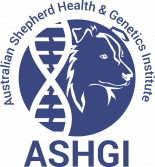The Advantage of Open Health Registries
by C.A. Sharp
First published in Double Helix Network News, Spring 2012, Rev. Sept. 2013

Susan started talking to other breeders, trying to find out where the problem had come from. In the process, she heard rumors that numerous offspring of David’s male either had cataracts or had produced them. Some people claimed the dog himself had developed them when he was 6 years old. After more investigation she learned that some of these rumors were true. David had lied to her. When she confronted him, he refused to give her a current eye report on his dog and threatened to sue her if she pursued the matter further.
Susan was furious and frightened. David had put her breeding program and those of others at risk. His actions had caused avoidable misery to dogs and their owners. She knew remaining silent would only add to the problem, but what could she do?
The story of Susan and David is a composite of several incidents. Sadly, scenarios like this have played out time and again in breed after breed. Concerned breeders like Susan work with each other and share information. They place ads or write articles aimed at educating other breeders. They may develop lists of dogs known to have had or produced a genetic disease. And sometimes one or more “Incorrigibles” like David force them to abandon their efforts. For many years, the culture enveloping purebred dogs has provided more support to the Davids among us than it has for the Susans.
Conscientious breeders lament that they can never be entirely sure that people they have depended on for information have been straight with them. This problem is especially difficult for those who are relatively new to a breed. Novices often ally themselves with mentor breeders while they are learning the ropes, but not all mentors are created equal when it comes to knowledge and honesty about genetic health issues. Even experienced breeders can be lead astray by people they thought they could trust. Fortunately for us and our dogs, things are beginning to change.
For twenty years or more, until his death in 2005, Dr. George Padgett, a veterinary pathologist and writer/lecturer on canine genetic health issues, has been telling breeders that if they want to control genetic disease they must start talking about it openly. Aware of the huge difficulties facing individuals in collecting useful genetic disease data, he and other scientists, veterinarians and breeders who were members of the International Elbow Working Group took a bold step. In 1990 they founded the Institute for Genetic Disease Control. GDC, modeled in part on the previously established open health registry operated by the Swedish Kennel Club, offered the first open disease registry in North America.
Initially, GDC tracked only hip and elbow data. As time passed it expanded to include eye exam results and a variety of breed-specific issues, taken on at the request of and in cooperation with concerned breed clubs.
Open health registries and published screening test results have been commonplace in some European countries for a number of years. All the Scandinavian countries and Great Britian have open health reporting for orthopedic, eye, and some other diseases plus DNA test results. In the Netherlands and some other countries, breed clubs publish results of standard health screening tests. (The Dutch kennel club is in the process of establishing an open registry.)
Unfortunately, too many in the purebred dog culture in the US were indifferent if not actively opposed to the open registry concept. GDC remained largely unrecognized and little used. Within a decade of its founding it was at risk of shutting down. To preserve what it had accomplished, GDC turned most of its data over to the Orthopedic Foundation for Animals (OFA) in 2002.
Historically, the Orthopedic Foundation for Animals provided a closed registry that publicly listed only phenotypically normal dogs. During the 1990s, OFA came to recognize the importance of open reporting and initiated a “semi-open” system. They expanded their services from hip dysplasia and other orthopedic diseases to a broader range of health concerns. With the owner’s permission, results of affected dogs will be listed along with identifying information about the animal, including the names and registration numbers of its parents and their own test status, if available.
OFA now registers screening results for hips, elbows, patellas, Legg-Calve-Perthes Disease, cardiac abnormalities, thyroid disease, congenital deafness and sebaceous adenitis. With genetic research leading to DNA tests for various canine ills, OFA will no doubt be adding other conditions to the registry in the future.
About the same time that OFA developed it’s semi-open registry service, the AKC Canine Health Foundation initiated the Canine Health Information Center with a view to developing, in cooperation with breed clubs, an open source of genetic disease information on specific dogs CHF combined forces with OFA to bring CHIC on line. CHIC now provides information on almost three dozen breeds. It automatically receives all OFA open data and CERF normal data. Other information (failed CERF exams, PennHip reports, etc.) must be submitted directly by the owner of the dog.
When a dog has completed its breed’s CHIC requirements, the owner will receive a certificate and the dog and its test results will be listed on the CHIC website. Minimum CHIC requirements for Australian Shepherds are hips, elbows and eyes. Thyroid is optional. Other OFA registered tests (heart, patellas, etc.) which have been submitted and designated open by the owner would also appear in the CHIC record. Should additional tests be recognized as essential they could be added to the Aussie’s CHIC protocol.
CHIC is voluntary. If an owner elects not to allow OFA affected data to be shared or declines to send in other kinds of information, CHIC does not pursue the matter nor are there any sanctions against those who decline participation. The hope is that as more people become involved peer pressure will bring some of the reluctant into the fold.
OFA and CHIC are not the only available open registries. In some cases, individual breed clubs or organizations in the US maintain their own programs. Bearded Collies, poodles and Portuguese Water Dogs are a few breeds that have single-breed health registries. These may or may not be open and may or may not be associated with the national clubs. Aussies in North America do not have any official disease registries outside the all-breed organizations.
European databases vary, but most record at least hips and eye screening results. In Europe, publication of results—even bad results—may be mandatory.
There is already a great deal of information available to the breeder who is willing to look for it. OFA and CHIC have easy-to-search on-line databases. The Canine Eye Research Foundation also has one, though it lists only phenotypic normals. With the open registries you can discover what dogs have failed a particular test, what results are recorded for a particular kennel and which offspring of a particular stud have results recorded. The OFA site is especially easy to search. Some European databases are also searchable, though you will need to understand the language or find a translator to help you.
Since the US databases do not list negative results without the active consent of the dog’s owner, some information may not be available. While you cannot know the status of an unlisted animal, conspicuous absences (i.e. no hip listing for the 4-year-old stud, Ch. Bigwinner Last Year) can suggest questions you will want to ask if you are interested acquiring or breeding relatives of the absent dog. Beware sires or kennels that have many missing names for a screening test that should be standard.
Active participation in open registries needs to become the gold standard for serious breeders. Only through the open exchange of genetic information will we be able to make serious impacts on the incidence of genetic diseases in purebred dogs. Certainly the long and commonly held opinion that all Aussies should have their hips and eyes screened has made those exams near universal among breeders who wish to be taken seriously. Breeders who are discovered to have failed to do standard screening on breeding animals are risk being held up ridicule. They may find their dogs are avoided by their peers.
In a perfect world, everyone would willingly share information about genetic issues in their dogs. But the world isn’t perfect and there will always be those who will not come clean. Listing with the open health registries should become just as much a hallmark of responsible breeding as the faithful screening of eyes and hips. If conscientious breeders make it a regular practice and actively promote the idea, others will follow. When they do, the Susans of the future won’t have to rely on trust, they can verify.
++++++++++++++
What ASHGI has done to help:
Since inception, the Australian Shepherd Health & Genetics Instituted has been an advocate for the open registry concept and the open exchange of health information on breeding dogs. To that end ASHGI has established the following programs:
The International Database for Australian Shepherd Health (IDASH)
Ten Steps to a Healthier Australian Shepherd Breed (10-Steps)
